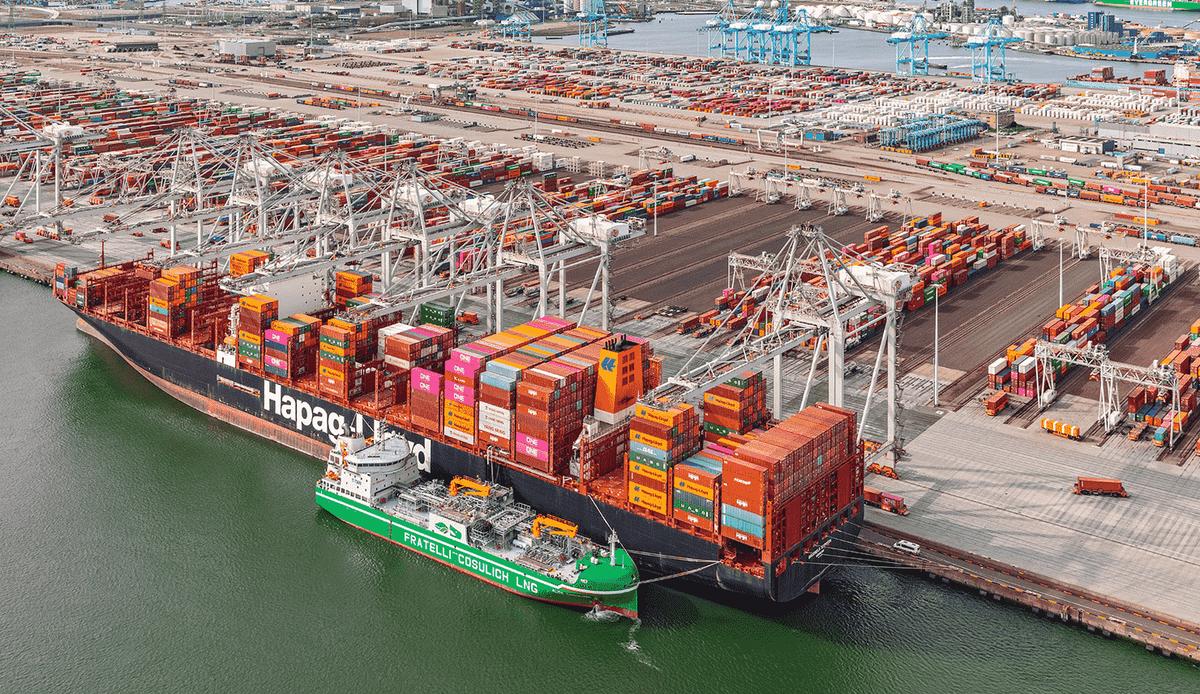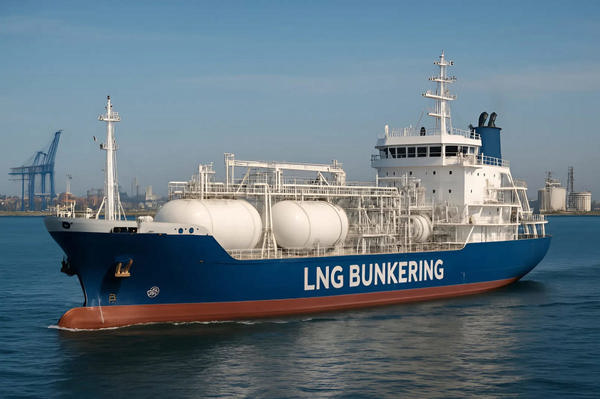Retailers will pay premium for CO2 reduction via book-and-claim system
Hapag-Lloyd's book and claim system will allow cargo owners to claim up to 90% CO2 emission reduction compared to conventional fuels, Zero Emission Maritime Buyers Alliance (ZEMBA) claims.
 PHOTO: Hapag Lloyd's containership, Brussels Express, bunkered with 2,200 mt of mass-balanced liquid biomethane in Rotterdam. Titan Clean Fuels
PHOTO: Hapag Lloyd's containership, Brussels Express, bunkered with 2,200 mt of mass-balanced liquid biomethane in Rotterdam. Titan Clean Fuels
German container shipping major Hapag-Lloyd will source "blended" liquefied biomethane (LBM) from suppliers, ZEMBA explained. The biomethane component of the blend will be produced from organic manure and waste and will be certified as sustainable by the International Sustainability and Carbon Certification-EU (ISCC EU).
“Compliant with current EU regulation (EU RED II), the waste-based biomethane associated with this deal will be delivered to the European gas grid on a mass balance basis,” ZEMBA said in a statement.
“The ZEMBA team considered the possibility of delivering the fuel directly to a vessel, but doing so would have incurred both higher costs and greater emissions to transport the fuel,” it added.
In this context, the mass balance principle refers to the accounting method used to track the flow of sustainable bunker fuel in the supply chain, when blending renewable and non-renewable feedstock. The process involves quantifying the amount of sustainable fuel used during bunkering as well as the blended product. This will theoretically ensure that the blended fuel is not claimed to be greener than the quantity of sustainable feedstock used.
Hapag will then allocate carbon credits equivalent to the reduction of greenhouse gas (GHG) emissions achieved from the injection of LBM in the European grid to ZEMBA members using a book and claim mechanism.
ZEMBA members including Amazon, Nike, Patagonia, Meta, New Balance, Green Worldwide Shipping and other global retailers will pay a premium to receive credits for emissions reductions from Hapag Lloyd. This way, a cargo owner can claim emission reduction even if the vessel carrying its cargo is powered by fossil fuel.
The emission reduction claimed by cargo owners through book and claim system will be verified by shipping non-profit Mærsk Mc-Kinney Møller Center for Zero Carbon Shipping (MMMCZCS) and renewable energy non-profit RMI.
Book-and-claim is a supply chain model that allows cargo owners to purchase emission reduction credits from shipowners that have already invested in low- and zero-emission fuels. The carbon savings are then documented in the buyers’ emissions dashboard and audited annually by a third party.
“ZEMBA’s inaugural tender process demonstrates that cargo owners are willing to pay more for premium, zero-emissions shipping services, but are struggling to access those fuels at the scale required for commercial deployment. The Maritime Book and Claim System links this demand signal with a credible and transparent chain of custody model,” MMMCZCS explained.
“By decoupling fuel attributes from the physical value chain, book and claim enables transactions of a digitalized version. This ensures that cargo owners can make real investments in low-emissions fuels, moving the market from announcements of e-fuel projects to actual investments, deployment, and cost-competitive commercial availability.”
The pilot contract with Hapag Lloyd will run for two years starting next year. The retailer coalition claims that its next contract for low-emission shipping, scheduled to begin in 2027, will include e-fuels.
The maritime industry will need to accelerate a transition to synthetic fuels that do not rely on biogenic feedstocks, since biomethane will be in high demand across sectors in the coming years, ZEMBA said. “This is another reason why ZEMBA will adjust its next tender specifications to explicitly target e-fuels,” it concluded.
By Konica Bhatt
Please get in touch with comments or additional info to news@engine.online






